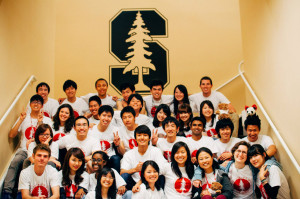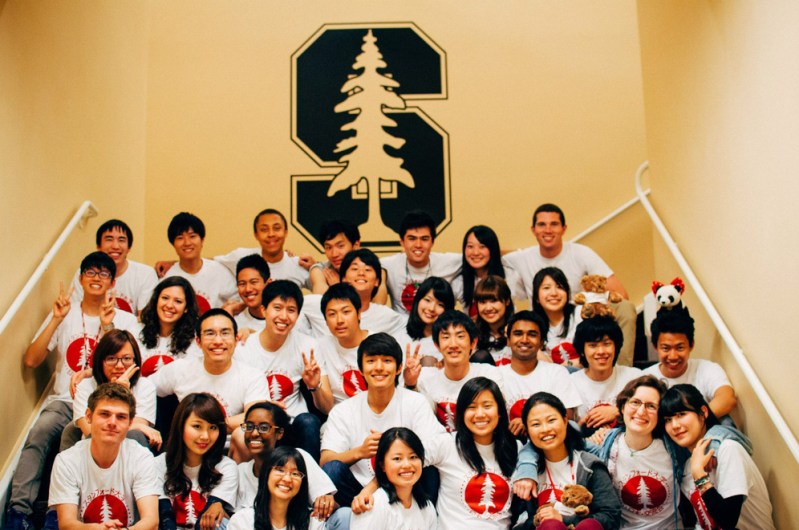
For the first time since its founding over 60 years ago, the Stanford Japan Exchange Club (SJEC) will not return to campus this school year.
Each year since 1954, the club has brought about 15 Japanese exchange students from across the Pacific to engage in a month of cross-cultural interaction and learning through a variety of workshops and activities. The project culminates in an academic presentation put on by the exchange students for their hosts, drawing comparisons between Japan and the United States in a topic of their choosing — such as higher education, sociocultural issues or employment opportunities.
But Student Activities & Leadership (SAL), which is responsible for overseeing and approving student groups, has reassessed school policies regarding exchange programs and overnight guests over the last two years. As a result, SAL officially turned down SJEC’s bid for approval on October 19, ending the group’s hopes for a program for the winter quarter of 2016.
“It’s not a decision we necessarily enjoy giving, as far as having to end a program,” said Snehal Naik, Assistant Dean and Associate Director of SAL. “They’re very dedicated students.”
“I think it’s a shame,” said Meagan Shinbashi ’17, co-president of SJEC, of the decision. “I feel like the people that you meet during the program, the human interactions and relationships that you create, is something that you can’t get anywhere else.”
Before the 2015 program, SJEC was entirely run by Stanford students, who were responsible for communicating with three Japanese universities, selecting the final applicants, and designing the academic portions that the exchange students participate in, said Josh De Leon ’17, an officer of SJEC. De Leon added that SJEC is responsible for raising all of the money for its expenditures.
“What’s frustrating for us, I think, is that we have an organization that has always run really well, that doesn’t actually use university money,” De Leon said. “There’s definitely positive impacts, and as far as I can tell, no negative impacts so far.”
“They didn’t understand how we could have existed”
Shinbashi said that SJEC’s troubles began about three years ago; this was about the same time as the founding of the Office of International Affairs (OIA), according to Naik. OIA Director Brendan Walsh said that his office was created to sort out potential contradictions in policies between other departments, and that the OIA was not involved with SAL’s decision. However, his office’s clarification of policies indirectly led SAL to reconsider SJEC’s legitimacy.
“[SAL] contacted us about two years ago, saying that there was a problem with the program and that they would need to shut it down,” Shibashi said.
In early 2014, SJEC called upon some “powerful alumni” from a few decades ago — “CEOs in Japan [and] high-powered lawyers,” De Leon said — and was prepared to seek their support. SAL ultimately agreed to let SJEC continue under a “trial year” for the 2015 program on the condition that the group assemble an advisory board from faculty members. One of their advisors was Richard B. Dasher, Ph.D., who serves as the Director of the U.S.-Asia Technology Management Center and Executive Director of the Center for Integrated Systems, both at Stanford.
Shinbashi and De Leon said that the trial year finished amid positive feedback from students and faculty alike. Subsequently, SAL told SJEC that they would decide whether or not to keep the program at the start of the new school year in late September.
“There was a certain date that they were supposed to tell us,” De Leon said, “but they didn’t actually tell us by that day.”
By early October SAL had still not informed SJEC of its fate. Not wanting to rush their Japanese counterparts, SJEC told them to start deciding on who their final applicants would be.
“We told the Japan side to just proceed with their advertisement, because we’re on a strict deadline,” Shinbashi said. “We told [SAL] that we told the Japan side to proceed, and it was after that that they told us no. Because they did not meet their deadline, we felt that we had the right to proceed with the program, and they said no, we don’t.”
De Leon says that the main reason SAL gave SJEC for the group’s cancellation was a policy that forbids exchange programs from taking place during the academic school year.
“[SAL] cited a rule that — supposedly — bans exchange programs, and they said that they didn’t understand how we could have existed… because Stanford’s not allowed to have exchange programs,” De Leon said.
However, Naik said that SJEC “wasn’t a real exchange program” because the Japanese students were only coming for a month and not receiving academic credit for their participation.
“For the last 10-15 years, [SJEC] has been registered as a student organization, and [the exchange students] come for one month, so it’s more of a social experience,” Naik said.
Naik also cited Residential & Dining Enterprise’s (R&DE) overnight guest policy, which stipulates that guests may only stay five nights in campus housing. SJEC is a month-long program, and although it was granted an unofficial exception to this rule in previous years, SAL is no longer willing to do so.
What’s next for SJEC
Although a 2016 program is out of the question, SJEC is deliberating what can be done to bring the club back in some form. According to Naik, SAL met with SJEC on October 22 to discuss options for SJEC to return in the future.
“They had decided to take a year off, and regroup themselves,” Naik said. “To figure out what their goals are and see if what they could propose was in line with what we were expecting.”
“What SAL has envisioned is that we do a week-long program, where we would focus specifically on one topic, and the student would just learn about this one topic with other Stanford students,” Shinbashi said.
This format would be similar to the annual summit held by the Asia-Pacific Student Entrepreneurship Society (ASES), and could feature guest speakers from Silicon Valley. If SJEC does become a conference, it would be held within the first two weeks of winter or spring quarter.
Another option SJEC has is to become a Stanford Summer Session, which runs for eight or nine weeks from June to August and balances (credited) academic courses with social activities. Walsh said that Summer Sessions “can help facilitate strategic academic partnerships between Stanford and foreign institutions,” and that the OIA would be willing to help if SJEC decided to take that course of action.
Dr. Dasher said that he is currently in discussions with SJEC about their possible next steps, and expressed his support for the group.
“The student leaders have done a great job of running SJEC responsibly up to now,” Dr. Dasher said. “The program has yielded important connections for Stanford among top business people and policy leaders in Japan over the years.”
De Leon firmly believes that SJEC will return to Stanford in some form or another.
“We know we do a good thing, and we know that the grounds they’re shutting us down on aren’t commensurate to the benefit that we’re providing to the university — if they even have grounds at all,” De Leon said. “We’re going to do our best to make sure that SJEC survives, and we’re hoping we can make it thrive.”
Contact Jacob Nierenberg at jhn2017 ‘at’ stanford.edu.
